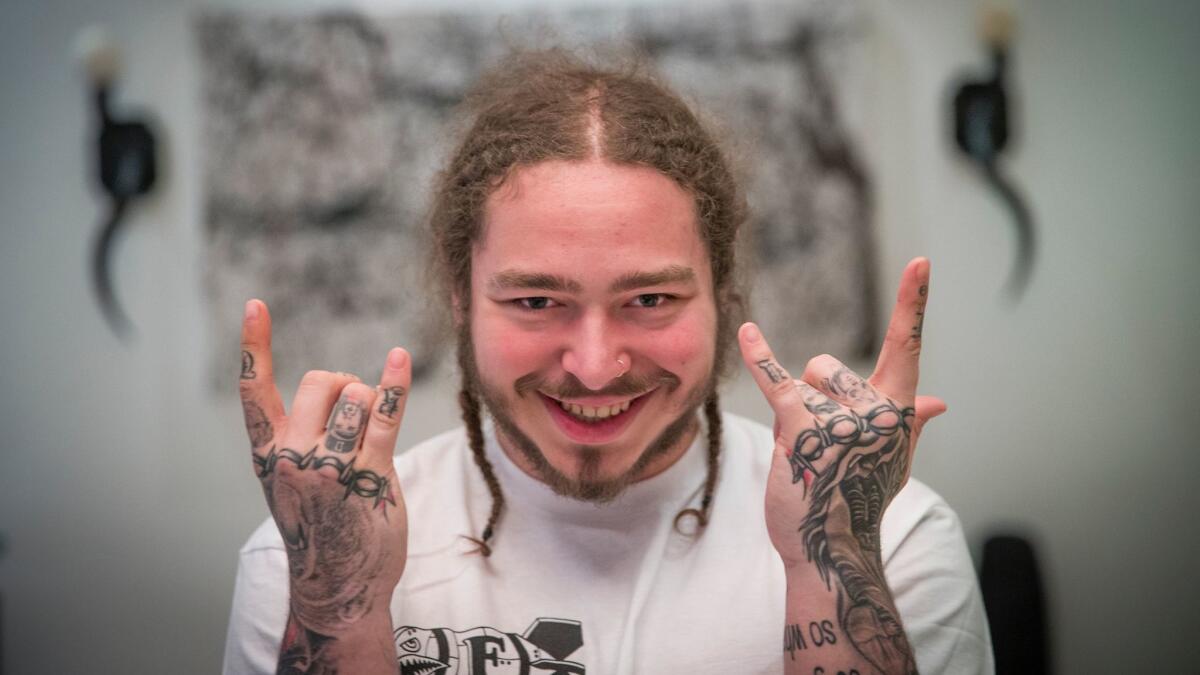Why Post Malone has been called ‘the Donald Trump of hip-hop’

Post Malone has heard all the criticisms.
He’s a white “culture vulture,” as he put it, cynically appropriating African American culture. He’s received more attention than his meager talent deserves. He’s a rich kid whose parents essentially paid his way into music.
“There’s a thing that says they bought 50,000 of my songs on iTunes,” said the young singer and rapper best known for his spacey hit single “White Iverson.”
“My dad’s not a baller! I have no idea where he’d get the money for that.”
In spite of these accusations — or perhaps because of them — Malone, 21, has flourished in hip-hop, a genre obsessed with authenticity.
Early this year, “White Iverson,” in which he compares his swagger to that of basketball’s Allen Iverson, reached No. 3 on Billboard’s rap chart. Kanye West drafted him for a verse on “The Life of Pablo.” And now he’s just released his debut album, “Stoney,” with appearances by 2 Chainz and Quavo and production by Illangelo, who’s known for his work with the Weeknd.
“Post is like the Donald Trump of hip-hop,” said Rob Stevenson, an executive at Malone’s label, Republic Records. “Things that should’ve killed his career have only made him bigger.”
To a certain extent this is a story of white privilege. That’s certainly part of the connection between Malone and Justin Bieber, another polarizing figure with whom the rapper toured over the summer. (Try to imagine America forgiving a black pop star for urinating in a restaurant’s mop bucket, as Bieber was caught doing on video.)
As with Bieber’s album “Purpose,” though, what’s remarkable about “Stoney” is how uncalloused Malone seems by the punches thrown his way. Instead of bitterness, the record offers sensitivity; where he might’ve gone hard, he went soft.
Full of delicate guitars and dreamy synths, not to mention Bieber’s creamy vocals in the song “Deja Vu,” “Stoney” may be the year’s most vulnerable-sounding rap album — hardly what you’d expect from a guy with every reason to have his guard up.
“It’s not easy to come from that kind of space in a hip-hop song,” Malone acknowledged recently at his rented mansion in Encino. Having woken around 4 p.m. after what he described as a long night with friends, the rapper was wearing Hello Kitty pajama pants as he sat curled in an armchair, leisurely smoking a cigarette.
Yet he had a vision, he added — something less aggressive and more sensual than what he was hearing around him.
But more than a calculated bid to boost his profile — by making himself palatable to Bieber fans, for instance — “Stoney” feels like a genuine product of Malone’s considerable quirks: the sing-song delivery, the off-kilter slang, the interest in guitar he showed off at his house when he picked up an instrument with his name etched into the fretboard and peeled off a series of impressive licks.
Maybe the copycat has become an original.
According to Illangelo, there’s a childlike quality to Malone that enables him to pursue an artistic impulse without overthinking it.
“It’s like he hasn’t grown up, and to me that’s key to creating,” the producer said, adding that the same quality might be why Malone has been able to brush off so much scorn.
The rapper seemed to agree, admitting that he’s still figuring out stardom in the wake of the viral success “White Iverson” met following its initial appearance online in February 2015.
“This all happened so quick — you wake up and you’ve got a million views,” he said. “I don’t know what the hell I’m doing.”
Malone grew up in Texas, where his father works for the Dallas Cowboys, and played in a heavy rock band before he began rapping. He moved to Los Angeles when he was 18 to focus on music. Things went well until he got “mixed up with some shady people,” as he put it.
“I signed a contract, it was weird stuff,” he said, declining to go into further detail. “That was a big tie-up for me. It prevented me from doing what I wanted to do,” which was follow up “White Iverson” with his debut album.
While he waited he put out a mixtape this year, “August 26,” that featured an unlikely cover of Fleetwood Mac’s “Dreams.”
“Stevie Nicks is dope,” Malone said. “There’s so many hip-hop and R&B melodies in those songs that you could incorporate into a hip-hop track.”
He also did the Bieber tour, which Republic’s Stevenson said was “like going to school” for Malone, in terms of learning how to work a crowd and how to adapt his voice to arena dimensions.
“I was so scared at first to come out in front of 20,000 people, afraid it would just be crickets,” the rapper recalled. “But the audience was so supportive. The whole place was singing along to my one good song.”
Next year he’ll head to Europe to support “Stoney” in a land perhaps less preoccupied than America with the narratives of ownership that course through hip-hop.
Not that Malone was thinking of it that way.
“Oh, we’re going there?” he said, happily oblivious, when asked about the overseas tour. “That sounds like fun.”
Twitter: @mikaelwood
ALSO
The 10 best albums of a year defined by loss
Times music writers pick their favorite songs of 2016
The Grammys have finally embraced Justin Bieber. But is this progress?
More to Read
The biggest entertainment stories
Get our big stories about Hollywood, film, television, music, arts, culture and more right in your inbox as soon as they publish.
You may occasionally receive promotional content from the Los Angeles Times.











